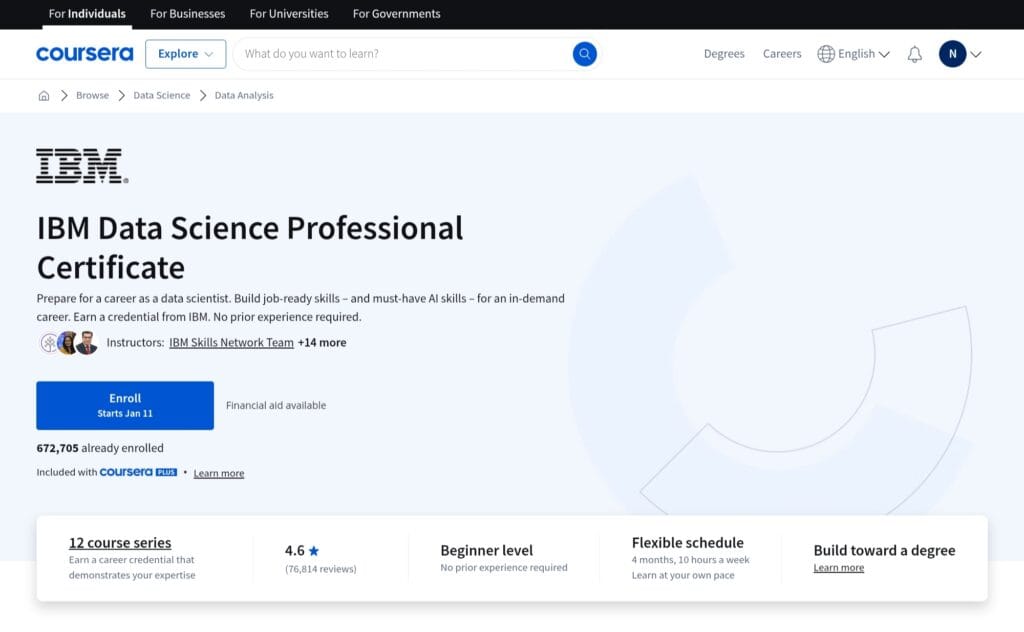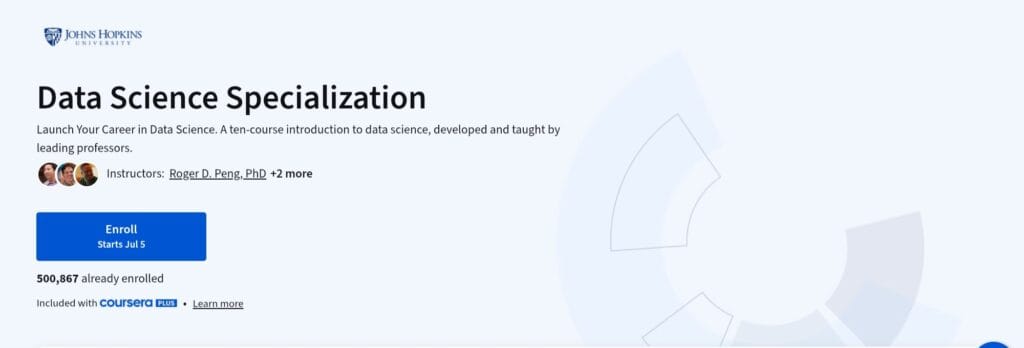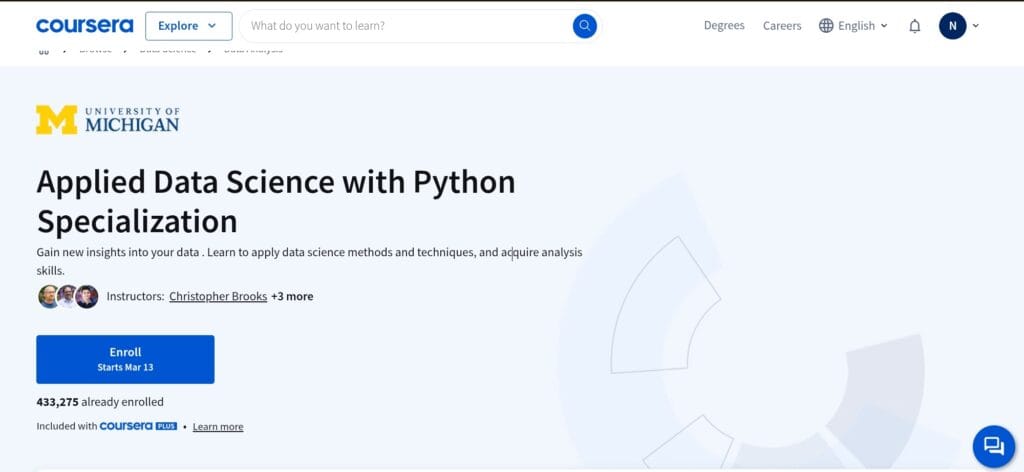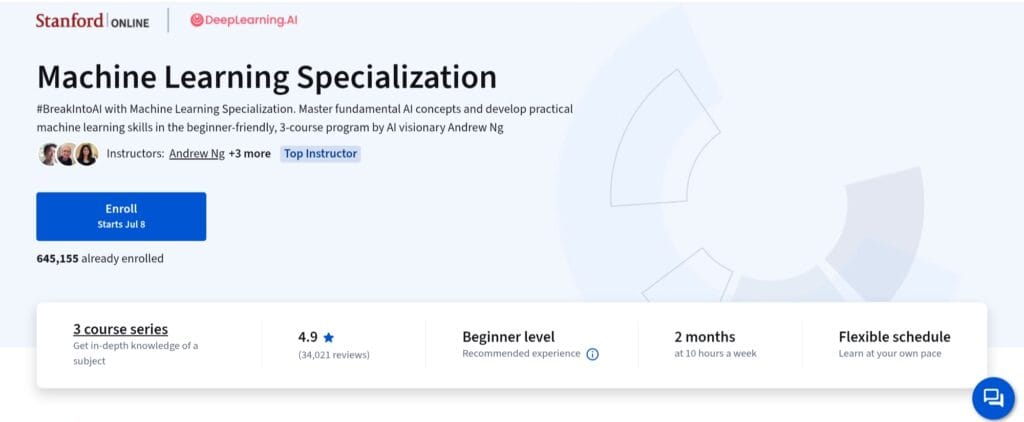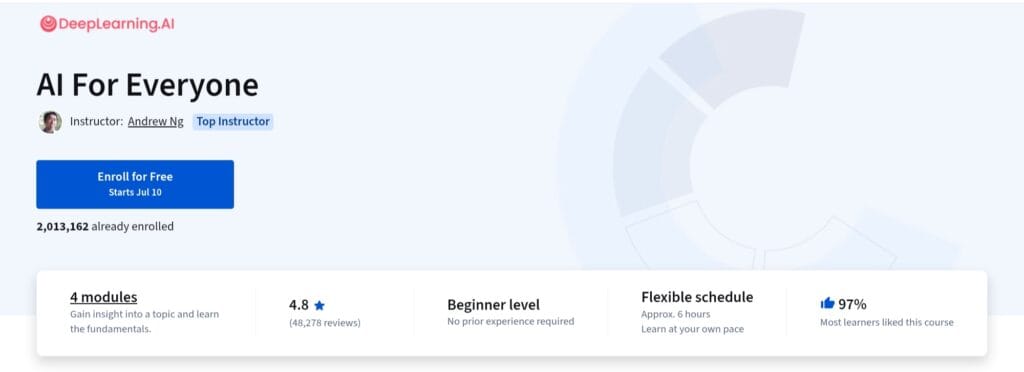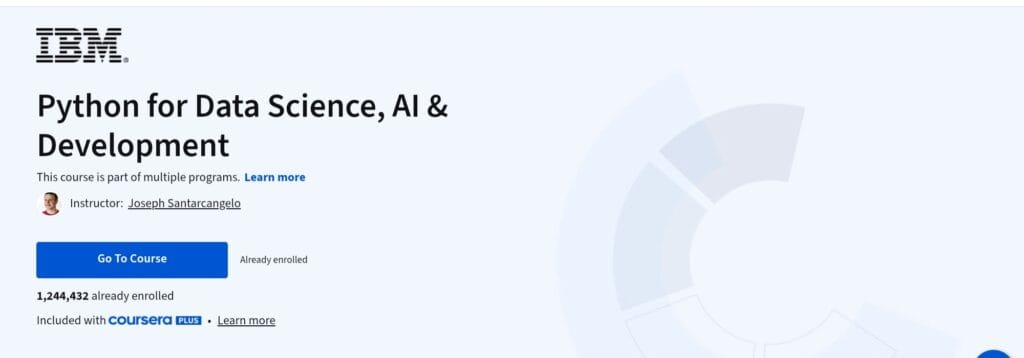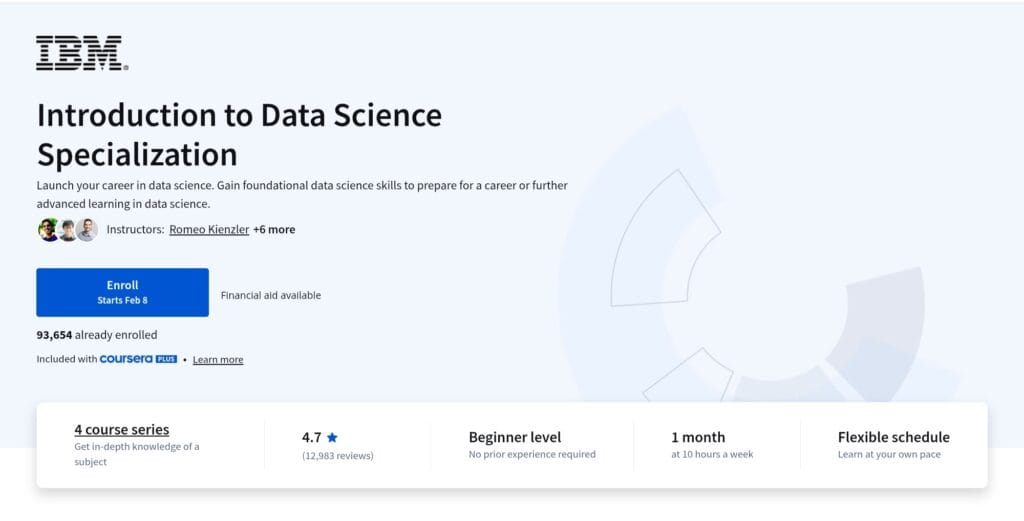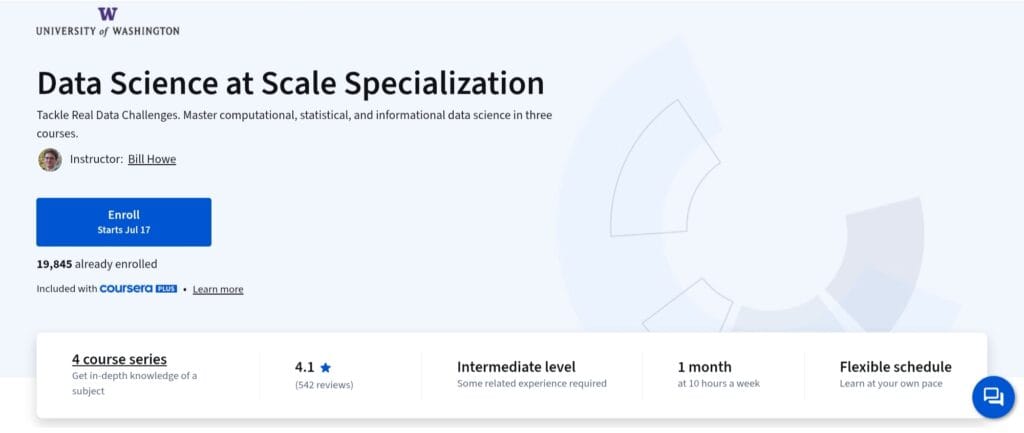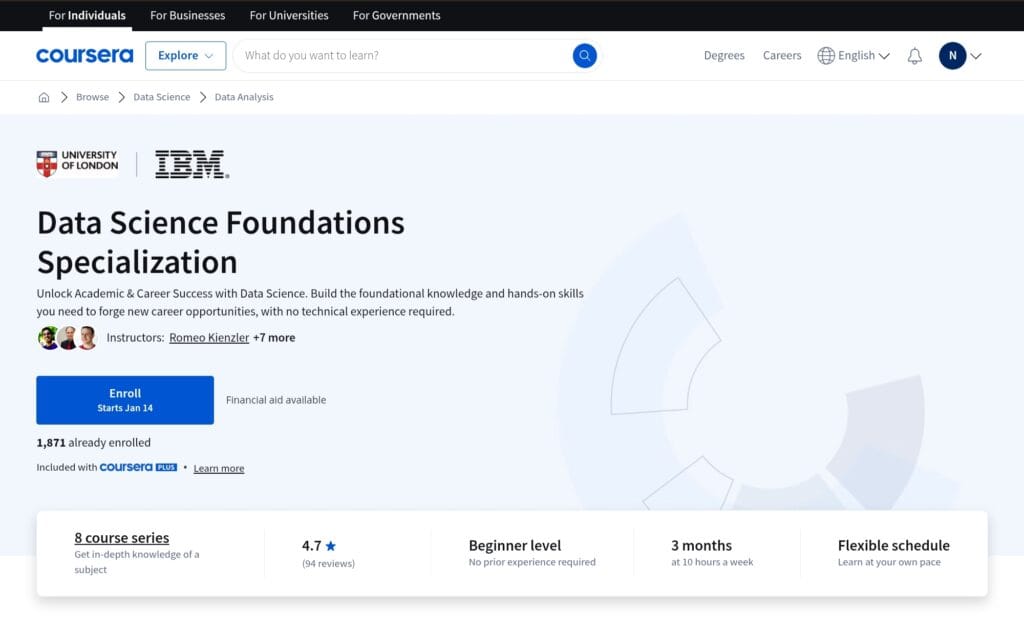Last updated on September 2nd, 2025 at 03:13 pm
Data scientists are in high demand across all businesses. Businesses, ranging from multinational corporations to healthcare providers, are seeking experts who can transform unstructured data into actionable insights.
One of the most sought-after and lucrative professions in today’s labor market is that of a data scientist, as more businesses adopt data-driven decision-making.
But having the correct talents is more important for entering into this area than having passion or interest. Selecting the appropriate course is an important step for new students and those changing careers.
In addition to teaching fundamental ideas like Python, statistics, and machine learning, a well-designed curriculum equips you with the skills you need to handle real-world problems through projects, case studies, and practical assignments.
In this regard, Coursera is unique. With courses created by prestigious colleges like Stanford and Johns Hopkins as well as business titans like Google and IBM, Coursera provides a special blend of academic rigor and real-world experience.
In addition, several of these courses offer professional certifications, capstone projects that are suitable for a CV, and even services for job placement.
This post will discuss the top 10 data science courses on Coursera that can help you get your first job. Every course is chosen with care, taking into account learner feedback, industry relevance, career outcomes, and the quality of the content.
Whether you’re new to data science or coming from another profession, this guide will help you figure out the best course of action.
Why Choose Coursera for Data Science?
Coursera is one of the most reputable and well-liked online learning environments for data science, and for good reason.
In order to assist newcomers in developing practical skills and making a seamless transition into the workforce, it provides a broad choice of courses and specializations.
The solid collaborations that Coursera has are one of its greatest advantages. Top colleges, including Stanford, Johns Hopkins, and the University of Michigan, as well as well-known tech firms like IBM and Google, have developed data science programs.
These aren’t merely theoretical lectures; they’re interactive, real-world courses centered on applying industry-standard tools to solve actual data problems.
Another significant advantage is the opportunity to obtain industry-recognized qualifications. You can use professional credentials from several of Coursera’s data science courses on your LinkedIn profile or résumé.
Often from brands they already trust, these credentials demonstrate to prospective employers that you have acquired applicable, employable abilities.
The flexibility of Coursera’s timetable is a huge benefit for people balancing employment or other obligations. You don’t have to sacrifice the breadth or caliber of the material to learn at your own speed and convenience.
For students who have never taken a course before, introductory courses are ideal since they begin with the fundamentals and work their way up to more complex subjects.
Additionally, Coursera offers additional career support through interview preparation, resume-building resources, and in certain professional certificate programs, to help find a job. This platform is intended to assist you in advancing in your job as well as for learning.
The Coursera Plus Subscription plan gives you access to 10,000+ courses and specializations on Coursera. It also comes with a 7-day free trial, allowing you to check the benefits before subscribing.
How to Select the Right Course for Your Goals
With so many data science courses available on Coursera, it’s critical to select one that fits your educational background, preferred method of learning, and professional objectives.
Not all courses are made equal, so what suits one person may not be the greatest option for you. Here are some important things to consider before choosing.
Start with your current skill level. Choose beginner-friendly courses that cover the fundamentals, such as Python, statistics, and basic data manipulation, if you’re new to programming or data analysis.
Programs that go deeper into data visualization, SQL, or machine learning may be sought after by intermediate learners. Courses centered on deep learning or specialist fields like computer vision or natural language processing might be more beneficial for advanced students.
Think about who’s teaching the course. While industry-led courses, such as those offered by Google or IBM, frequently highlight real-world tools and practical abilities, university-led courses are typically more theoretical and academic in nature.
Seek a course that strikes a balance between both, ideally combining practical experience with a solid intellectual foundation.
Project-based learning is key. Doing is the greatest way to learn data science. Courses that incorporate case studies, capstone projects, or real-world projects are extremely beneficial. These give you concrete work to display in your portfolio or at job interviews, in addition to improving your understanding of the subject matter.
Consider your budget and time. Certain courses are a component of professional certificate programs or extended specialties that can take many months to finish. Others are brief, targeted, and auditable.
You can always audit the content for free and get the certificate when you’re ready if money is tight.
Finally, look at the job outcomes.
Some Coursera courses are included in career-focused tracks that grant access to Coursera’s Career Services, which provide job listings, interview preparation, and resume assistance.
If getting a job is your first priority, programs referred to as “Professional Certificates” are worth looking into because they frequently offer better career help.
Finding the course that works best for you is more important than selecting the “best” one overall.
List of The Top 10 Data Science Courses On Coursera
1. IBM Data Science Professional Certificate
Institution/Provider: IBM via Coursera
Ideal For: Beginners, career switchers with no prior coding experience
Duration & Effort: 4 – 5 months at ~10 hours per week (177 hours total)
Key Skills Covered: Python programming, SQL, data cleaning, exploratory data analysis, data visualization, machine learning, Jupyter Notebooks, GitHub, RStudio, Watson Studio
Why it’s Great for Getting a Job
With nine courses and a capstone project, this extensive professional certificate takes students from the ground up to employability. It is perfect for novices and those changing careers because no prior knowledge of coding is necessary.
You’ll finish practical labs and projects throughout the curriculum, like using SQL to query census or crime data, developing housing price prediction models, and making interactive dashboards that are ready to display in a portfolio.
By completing the entire certificate, you can enter IBM’s Talent Network, which puts you in direct contact with job openings and showcasing resources, in addition to receiving a shareable IBM credential.
Additionally, students seeking official academic recognition may find the program appealing because it is credit-eligible through ACE®.
Although some students have pointed out a teaching approach that prioritizes self-directed code exploration, the majority concur that it creates a solid practical foundation; yet, in order to really stand out in interviews, it is advised to include personal projects.
Read Full Course Review – What will you learn in the IBM Data Science Professional Certificate course on Coursera?
2. Google Advanced Data Analytics Professional Certificate
Institution/Provider: Google via Coursera
Ideal For: Intermediate learners and career switchers with foundational analytics experience
Duration & Effort: 6 months at ~10 hours per week (≈240 hours)
Key Skills Covered: Python programming, exploratory data analysis (EDA), statistics, regression modeling, machine learning, Tableau, Jupyter Notebook, data ethics, feature engineering
Why it’s Great for Getting a Job
Google’s advanced, eight-course professional certificate moves students beyond the fundamentals of analytics and into the core of data science.
Its capstone project creates powerful portfolio components by simulating real-world duties, such as creating regression models, analyzing data, and visualizing conclusions. Within six months, 75% of graduates report favorable outcomes, including new jobs, promotions, or increases.
Graduates are admitted to an employment consortium of more than 150 firms, including Deloitte, Verizon, and Target.
Read Full Course Review – What Is The Google Advanced Data Analytics Professional Certificate On Coursera?
3. Johns Hopkins Data Science Specialization
Institution/Provider: Johns Hopkins University via Coursera
Ideal For: Beginners and those comfortable with R, especially learners focused on statistical thinking
Duration & Effort: ~7 months at 10 hours/week (≈280 hours total)
Key Skills Covered: R programming, data cleaning and wrangling, exploratory data analysis, reproducible research, GitHub, regression analysis, machine learning, data products, Shiny dashboards, version control
Why it’s Great for Getting a Job
This 10-course series, which was created by respected academics like Roger Peng and Jeff Leek, walks you through every step of the data science process, from absorbing and cleaning data to creating visualizations and sharing interactive products.
Its emphasis on R gives you reproducible workflows and statistical tools that are suited to the industry. Creating your own data product for your capstone project is a great way to strengthen your resume and make your portfolio stand out.
Learners report deep conceptual understanding and practical confidence. One Redditor said, “I completed… I learned a lot… they teach quite a bit… great for learning some R and stats”. Another adds that while peer grading makes scoring easy, the real value lies in the learning experience itself.
Though some find the R‑centric approach less relevant if your career path prioritizes Python, mastering R remains a valuable asset, especially for roles involving heavy statistical analysis.
If you’re aiming for traditional data science or analyst positions with strong statistical components, this specialization offers a solid foundation and a capstone to distinguish your resume.
Read Full Course Review – What Is The Data Science Specialization By Johns Hopkins University On Coursera?
4. University of Michigan – Applied Data Science with Python Specialization
Institution/Provider: University of Michigan via Coursera
Ideal For: Those with basic Python knowledge looking to dive deeper into data science using practical tools
Duration & Effort: Approximately 4 months at around 10 hours per week (≈160 hours total)
Key Skills Covered: Python (Pandas, NumPy), data cleaning and manipulation, data visualization (Matplotlib, interactive charts), applied machine learning, text mining (NLP), social network analysis, Jupyter Notebooks
Why it’s Great for Getting a Job
You can go from intermediate Python to expert data science approaches with this five-course specialization. Every subject contains practical exercises utilizing real-world datasets, such as constructing dashboards, evaluating texts and social networks, and developing prediction models.
Companies seek applicants who can not only understand algorithms but also use them in real-world situations; this specialization provides you with just that. Students on Reddit have reported that it’s rewarding yet difficult to gain confidence when navigating entire data science operations.
You will graduate from this program with a shareable certificate from a prestigious university and a number of completed projects to add to your portfolio. If you know the fundamentals and want to improve your applied skills, this is a great option.
Read Full Course Review – Applied Data Science With Python Specialization – A Comprehensive Course On Applying Data Science Methods And Techniques
5. Machine Learning Specialization
Institution/Provider: DeepLearning.AI & Stanford University via Coursera
Ideal For: Beginners with basic coding and math, plus early-career professionals seeking foundational ML skills
Duration & Effort: Approximately 2 months at 10 hours/week (total ~80 hours), across three courses
Key Skills Covered: Supervised and unsupervised learning, linear and logistic regression, neural networks with TensorFlow, decision trees, clustering, dimensionality reduction, recommender systems, model evaluation and tuning
Why it’s Great for Getting a Job
The Machine Learning Specialization, taught by renowned AI pioneer Andrew Ng, is a contemporary reimagining of his original course, redesigned in Python and adapted to the needs of data science today.
You can gain hands-on experience creating real-world models, like neural networks and predictive algorithms, thanks to its project-based framework.
Beginners can better understand complex ideas thanks to the specialization’s easy teaching style, which strikes a mix between hands-on code, visual explanations, and intuition.
This series has two main advantages for job seekers: first, it teaches useful skills using industry-standard tools like TensorFlow and scikit-learn.
Second, its Coursera certificate and instructor prestige are highly recognized—millions of students have taken Andrew Ng’s classes, and IT recruiters appreciate them.
Finishing it shows that you can create and use models in addition to understanding ML theory, which is exactly what employers are searching for.
Read Full Course Review – What Is The Machine Learning Specialization By DeepLearning AI On Coursera?
6. AI For Everyone
Institution/Provider: DeepLearning.AI via Coursera
Ideal For: Non-technical professionals, business leaders, managers—anyone who wants to understand AI without coding
Duration & Effort: ~6 hours total; self-paced, typically completed over 4 weeks (≈1–2 hours/week)
Key Skills Covered: Fundamental AI and ML concepts, AI terminology, how AI projects are structured, evaluating AI opportunities, working effectively with AI teams, understanding ethical and societal implications of AI
Why it’s Great for Getting a Job
Andrew Ng, a pioneer in AI, teaches “AI For Everyone,” a non-technical introduction to AI that unites data science and business. It’s ideal for anyone who wants to work with technical teams in positions like product managers, marketing analysts, consultants, or executives, since it helps them communicate clearly and make AI-based strategic decisions.
The course provides a formal framework for implementing AI projects within enterprises and clearly explains what AI can and cannot achieve.
In today’s job market, it is more crucial than ever to comprehend how AI fits into corporate operations and strategy.
Many businesses now prize workers who can recognize AI prospects and communicate between engineering and business teams as entry-level jobs change.
Business and technology leaders have underlined the necessity of adjusting to AI tools in order to remain relevant and employable.
By completing this course, you can demonstrate to potential employers that you understand the strategic side of data-driven projects and add a Coursera certification to your resume.
Read Full Course Review – What Is The AI for Everyone Course By DeepLearning AI On Coursera?
7. Python for Data Science, AI & Development
Institution/Provider: IBM via Coursera
Ideal For: Absolute beginners interested in Python fundamentals and data-related programming
Duration & Effort: ~4–6 weeks at 4–6 hours per week (approx. 20–30 hours total)
Key Skills Covered: Python basics (variables, loops, functions), data structures, file handling, NumPy, Pandas, Jupyter Notebooks, REST APIs, web scraping with BeautifulSoup
Why it’s Great for Getting a Job
This self-paced, introductory course walks students through the fundamentals of Python programming using examples from everyday life.
You will acquire the skills necessary for any data-driven position, including how to automate processes, alter data formats, and retrieve data from web and API sources.
For data science positions, a strong Python foundation is frequently the first prerequisite, and this course provides just that.
You may put new abilities to use right away with its practical labs and projects, and your CV will look more credible with the IBM certification.
Early mastery of the foundations boosts confidence and gets you ready for more challenging coursework or entry-level roles like junior developer or data analyst.
Read Full Course Review – Is the Python for Data Science AI and Development Course On Coursera Worth It?
8. IBM – Introduction to Data Science Specialization
Institution/Provider: IBM via Coursera
Ideal For: Absolute beginners interested in learning what data science is and how to start
Duration & Effort: Roughly 1 – 2 months at 5–10 hours per week (≈40 hours total)
Key Skills Covered: Core data science concepts, data science methodology, JupyterLab, RStudio, GitHub, SQL, data cleaning, SQL queries, big data tools, data mining, cloud basics
Why it’s Great for Getting a Job
This brief, four-course specialization provides students with a thorough foundation by outlining the tools that data scientists use, why data science is important, and how it is used across sectors.
In order to develop a starter portfolio, you will work with Jupyter and RStudio, maintain code on GitHub, use SQL in notebooks to query actual datasets, and do practical exercises.
This specialization demystifies data science in an organized and approachable manner for someone who is just starting out or experimenting.
Careers frequently start with familiarity with equipment and procedures; learners gain knowledge and confidence by finishing laboratories and initial projects.
Additionally, obtaining an IBM certificate gives LinkedIn profiles and resumes more legitimacy.
Additionally, it counts toward the more extensive IBM Data Science Professional Certificate, which provides a longer learning path for when you’re ready to advance your knowledge.
Read Full Course Review – What will you learn in the Introduction to Data Science Specialization?
9. Data Science at Scale Specialization
Institution/Provider: University of Washington via Coursera
Ideal For: Intermediate learners ready to work with large datasets and mature data systems
Duration & Effort: About 4 courses, (≈40-45 hours total) taken over 1-2 months at ~5–7 hours/week
Key Skills Covered: SQL and NoSQL scaling, Hadoop & Spark, MapReduce, predictive modeling, statistical visualization, big data ethics, cloud computing, unsupervised learning, feature engineering
Why it’s Great for Getting a Job
This specialization teaches you how to use contemporary big-data tools to process, store, and extract insights from large datasets in order to tackle real-world data difficulties.
You will work with distributed query systems, Spark, and Hadoop through hands-on exercises before creating scalable processes and visualizations. The ethical issues surrounding big data and artificial intelligence are interwoven.
Employers are looking for technical expertise, and this specialization provides it as data teams deal with distributed systems and billion-row datasets more frequently.
The capstone project, developed in collaboration with Coursolve, allows you to work through a real-world issue from start to finish, simulating the kinds of tasks you could encounter in real-world data science or data engineering positions.
In industries like banking, health analytics, and technology, showcasing your proficiency with Spark, Hadoop, and database systems will make your resume stand out.
Read Full Course Review – Is the Data Science At Scale Specialization On Coursera Worth It?
10. Data Science Foundations (University of London & IBM)
Institution/Provider: University of London & IBM via Coursera
Ideal For: Absolute beginners looking to build a strong multi-tool foundation
Duration & Effort: ~8 courses over 3 months at ~10 hours/week (≈120 hours total)
Key Skills Covered: Python and R basics, SQL, data collection and cleaning, exploratory analysis, visualization, CRISP‑DM methodology, version control (GitHub), dashboarding, simple predictive modeling with clustering and linear regression
Why it’s Great for Getting a Job
This practical specialization combines the University of London’s academic rigor with useful labs created by IBM.
Setting up environments (Jupyter, RStudio), cleaning up dirty datasets, creating predictive models, and visualizing insights that are pertinent to business are just a few of the real-world activities you will be working on.
Being able to use a variety of languages and tools will show that you are flexible, which is exactly what employers look for in a young data scientist.
The two separate capstone projects—forecasting bike rentals and SpaceX’s initial landings—provide well-executed, results-driven portfolio items.
Credibility is increased by obtaining a dual credential from a reputable university and a major tech company, and the curriculum emulates the workflow of actual data teams.
Read Full Course Review – What is Data Science Foundations Specialization on Coursera?
Final Thoughts
At first, breaking into data science might seem impossible, but it is completely doable with the correct guidance and a well-defined approach. Selecting a curriculum that aligns with your experience, preferred method of learning, and professional objectives is crucial.
There is a Coursera course on this list that is ideal for you, regardless of whether you are just starting out, changing careers, or honing your current skills.
Remember that theory alone is not enough to succeed in data science. True confidence and work preparation are developed via regular hands-on practice, such as writing code, evaluating actual data, and creating projects. Don’t be scared to try new things, go over difficult subjects again, and keep improving as you go.
Take that first step, then. Choose the course that appeals to you, make the commitment, and begin constructing your data science future right now. You’ll be prepared to land your first job and use data to make a difference sooner rather than later if you start early.
FAQ
Are Coursera data science courses good for beginners?
Yes, there are a lot of beginner-friendly Coursera courses that offer career certification, practical projects, and step-by-step instructions.
Can I get a job with a Coursera data science certificate?
Coursera certifications, particularly from companies like Google and IBM, can greatly increase your prospects, even though they are not a certainty. This is especially true when combined with projects.
How long does it take to complete a data science course on Coursera?
Professional certifications often need three to six months of part-time work (5 to 10 hours each week).
Do I need to know coding before taking a Coursera data science course?
Some courses, such as “AI for Everyone,” are intended for those who are not programmers. However, it’s usually advised to use simple Python.
Which is better: University-led or industry-led Coursera courses?
Both are worthwhile. While industry-led courses (such as those offered by Google and IBM) are more job-focused and practical, university-led courses tend to be more theoretical.
Share Now
Discover more from coursekart.online
Subscribe to get the latest posts sent to your email.



